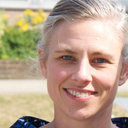The teaching staff of the MA Digital Media, Culture and Society, University of Brighton are active in academic research and creative practice. See individual pages about Dr. Kevin Biderman, Dr. Theodore Koulouris, Prof Julie Doyle, Dr. Aristea Fotopoulou, Dr. Paula Hearsum, Dr. Olu Jenzen, Ms Irmi Karl, Dr. Maria Sourbati, Dr. Julia Winckler, Dr. Eleftherios Zenerian, Dr. Ryan Burns, Conrad Moriarty Cole.
 Dr. Olu Jenzen
Dr. Olu Jenzen
Olu Jenzen lectures in media studies with research interests across critical theory, contemporary media, literature and popular culture, notably in the fields of feminist and queer theory.
Her research work focuses on the politics of aesthetic form, cultures of trauma, the representation of gender and sexuality in film, literature and popular culture and social aspects of non-normative epistemologies.
Dr. Julia Winckler (Course Leader)

Course Leader. Module leader MJM0 MJM07, MJM90.
Dr. Julia Winckler’s research interests include co-production of knowledge, Archives, Memory & Migration, Photography and activism. Co-researcher on a SSHR Canada project (2013-2018) for which Julia co-curated exhibitions in Toronto, Brighton and Lisbon.
Dr Aristea Fotopoulou‘s research focuses on critical aspects of digital culture, emerging technologies and social change. Her new book is entitled “Feminist activism and digital networks: between empowerment and vulnerability” (2017, Palgrave/MacMillan). Positioned at the intersections of media and cultural studies with science and technologies studies, she has published widely in the themes of information politics and big data, digital engagement, media literacy, intersectionality and queer theory, digital networks and feminism. She serves as Chair of the Digital Culture and Communication Section of ECREA (European Communication Research and Education Association). [READ MORE]
Paula is currently conducting a research project in collaboration with the British Library Sound Archive on the oral history of Popular Music Studies in the UK. Her latest article on ‘Alas, Poor Richard: fandom, personal identity and Ben Myer’s novelization of Richey Edwards’ life story’ will be featured in Volume! (2017). She is steering committee member of the AHRC project ‘Fifty Years of British Music Video, 1964-2014‘. Paula is a Principal lecturer at the University of Brighton and a Senior Fellow of the Higher Education Academy (HEA).
Dr. Eleftherios Zenerian
Dr Zenerian’s current research focuses on popular music and everyday life. Through a series of case-studies, each one deploying different methodological approaches including ethnography, self-ethnography, cultural biography of things, textual analysis, and in-depth interviewing, he investigates the different ways in which popular music fans engage with music and music technologies, how the meanings of music enter their everyday lives, and how fans participate in the production of popular music. The first output of this research was published in the Metal Music Studies journal in 2018 (issue 4.1).
Dr. Maria Sourbati
Dr Maria Sourbati’s research explores social implications of technological change and transformation of the media technologies and services through digitalisation and ageing.
Maria has developed expertise in communications regulation, communication and social policy, new media and older people, digital media, disability, age and ageism. Maria’s current research examines digital data, media technologies and age relations as part of complex sets of relations of power that shape a person’s experience along time and other social markers of difference, including gender, race and class.
Her research has also examined tensions inherent in policy-driven diffusion of digital technologies and locally situated modes of user engagement with ICTs. This strand investigates the politics of the digital switchover and user aspects in the ‘digital by default’ policy agenda from a social inclusion perspective. Maria’s earlier work on historically and technologically situated processes of media regulation has examined public service provision in electronic communications with a focus on diversity, universal access and media literacy.
Dr. Kevin Biderman

Dr Kevin Biderman has been working as an artist, theorist and lecturer for the past 20 years. He previously taught Critical and Historical Studies at the Royal College of Art and film-making at Goldsmiths, in addition to lecturing in Further Education. In 2005 he coauthored the book Londres en Mouvement and has more recently written for the Journal of Visual Culture amongst others. In 2017 he undertook an AHRC-funded research residency at the MayDay Rooms archive. Kevin has a socially engaged practice and works with numerous activist groups and unions.
Conrad Moriarty-Cole
Conrad Moriarty-Cole is a cultural theorist and philosopher whose research and teaching sits at the nexus between cultural studies, philosophy, software studies, media, and politics. His current research focus is on the relationship between computation and the social imaginary, considering the philosophical and political implications of the ingression of AI into everyday life, thought, and processes of meaning making.
Dr. Theodore Koulouris
Dr. Theodore Koulouris is interested in media theory and post-1850s literary history and theory, with a focus on politics, feminism, and the philosophy of media (media ethics, digital ontology, loss, mourning). He is also interested in the intellectual and sociocultural reception of Ancient Greek texts (mainly philosophy and drama).
Prof. Julie Doyle
Professor Julie Doyle researches in media and is an authority on climate communication.
Her research examines the ways in which media and culture shape our understandings of, and responses to, climate change.
With a particular focus upon visual communication, Dr Doyle has worked collaboratively with visual artists, and provided consultancy for environmental NGOs, government and the sustainability communications sector on best practice for climate and environmental communication.
Dr. Ryan Burns



